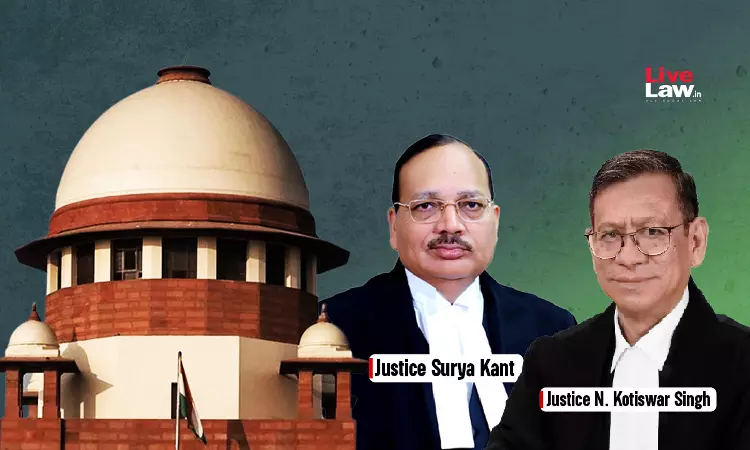- Home
- /
- Top Stories
- /
- 'Playing Cards Not Act Of Moral...
'Playing Cards Not Act Of Moral Turpitude': Supreme Court Sets Aside Disqualification Over 'Gambling In Public'
Debby Jain
15 May 2025 9:15 AM IST
"Every action against which one can raise eyebrow may not necessarily involve moral turpitude", Court said.
While restoring the election of a man to a Cooperative Society's Board of Directors, who was disqualified over his conviction for "gambling in public", the Supreme Court yesterday observed that playing cards is not an act of moral turpitude under all circumstances.A bench of Justices Surya Kant and N Kotiswar Singh heard the matter. The order was dictated as follows:"It seems from the...
While restoring the election of a man to a Cooperative Society's Board of Directors, who was disqualified over his conviction for "gambling in public", the Supreme Court yesterday observed that playing cards is not an act of moral turpitude under all circumstances.
A bench of Justices Surya Kant and N Kotiswar Singh heard the matter. The order was dictated as follows:
"It seems from the allegations that some persons, while sitting on roadside, were playing cards. They were apprehended on the spot and a fine of Rs.200 was levied on the appellant, without any trial. In the very nature of [...], we find it difficult that the misconduct attributed to the appellant involves moral turpitude.
We may hasten to add that the expression moral turpitude is used in legal as well as societal parlance to describe a conduct which is inherently [...], vile, depraved or having some connection to depravity. Every action against which one can raise eyebrow may not necessarily involve moral turpitude. There are so many forums for playing cards. It is difficult to accept that every form of such playing would involve moral turpitude, especially when those who are playing cards only as a mode of entertainment and to pass time.
The appellant has not been found to be a habitual gambler. He has been elected to the highest post. The consequential punishment of setting aside his election is highly disproportionate to the nature of misconduct attributed. We are satisfied that the impugned action taken against the appellant cannot be sustained...the election of the appellant to the Board of Directors of Society is restored."
To briefly put facts of the case, the appellant participated in the election to Board of Directors of respondent No.3-Society in Karnataka and got elected by securing the highest votes. However, respondent No.5, who lost the election, raised an election dispute before the Joint Registrar of Cooperative Societies alleging inter-alia that the appellant was convicted in a criminal case for the offence punishable under Section 87 of the Karnataka Police Act (gambling), which involved moral turpitude.
As such, it was averred, the appellant's election was liable to be set aside in terms of Section 17(1) of the Karnataka Cooperative Societies Act, 1959. The prescribed authority accepted the petition and set aside the appellant's election. His appeal as well as writ petition before High Court were also turned down. Thereafter, he approached the Supreme Court.
After hearing the counsels and perusing the record, the Supreme Court was of the view that the impugned action was disproportionate to the nature of misconduct attributed to the appellant and the alleged playing of cards (over which he was convicted) did not amount to an act of moral turpitude. Accordingly, the Court allowed the appeal and set aside the impugned action/orders.
Interestingly, Justice Kant noted during the hearing that in India, playing cards is a source of entertainment for the common man. "When we talk of diversity, inclusivity...as a nation, the difference between lifestyles, earnings, economic conditions...playing cards is a source of entertainment for common man. One of the cheapest and harmless way...moral turpitude is a different thing...".
The judge also reflected that there are countries which promote casinos for old people and the circumstances in which people play cards vary from society-to-society. "there are a lot of incentives [there]...they are served proper food, they are looked after...otherwise they are isolated, their children are not with them...there, they get company, elders are sitting together and playing...this all depends upon society to society...we can't afford those kind of things in our system because our people as such, middle class, below middle class...but some of them get together, they play cards...what's moral turpitude in this?" posed Justice Kant.
Case Title: HANUMANTHARAYAPPA Y.C. Versus THE STATE OF KARNATAKA AND ORS., SLP(C) No. 3969/2023
Citation : 2025 LiveLaw (SC) 647



